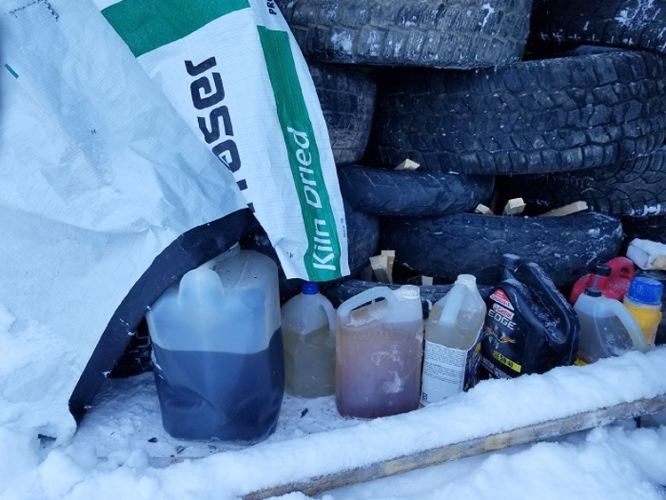RCMP are conducting an investigation into dangerous traps along Morice West Forest Service Road, southwest of Houston, B.C., after patrols found trees pre-cut for felling and stacks of tires containing jugs of fuel.
The Morice West Forest Service Road and Morice River Bridge - located 47 km southwest of Houston - are the location of an ongoing blockade by Wet'suwet'en hereditary chiefs and their supporters against development of the Coastal GasLink natural gas pipeline through the area. On Jan. 3, the Wet'suet'en hereditary chiefs and members of the Unist'ot'en camp issued an "eviction notice" to workers at camp 9A and the surrounding area.
In a statement released Wednesday afternoon, RCMP said they have brought their concerns to the Wet'suwet'en hereditary chiefs and have launched a criminal investigation under Section 247 of the Criminal Code for traps likely to cause bodily harm.
Officers from the Community-Industry Safety Office (C-ISO) are monitoring the situation along the Morice West Forest Service Road to ensure the safety of people at the blockade site, Coastal GasLink employees and general public, the statement said.
"On Jan. 6, 2020, during the course of regular patrols, officers attended the 39.5 kilometer mark and were stopped by a blockade of fallen trees. Officers conducted foot patrols towards the 44 kilometer mark, and noted several dozen trees had been felled across the roadway," the statement said. "Of particular concern for safety, they noted some trees that were partly cut in readiness for felling. This creates a hazard where these trees can fall unexpectedly due to wind. Three stacks of tires were also noticed, each covered by tarps and trees, and contained several jugs of accelerants - gasoline, diesel, oil, kindling and bags full of fuel soaked rags."
The RCMP respects the rights of individuals to peaceful, lawful and safe protest, the statement said, but the RCMP will act to ensure any person who unlawfully threatens the safety of people or property will be held accountable in accordance with Canadian law.
"This applies to demonstrators, industry employees and contractors, as well as the general public," the statement added.
"Our priority is to engage with (Coastal GasLink), Indigenous communities and government to facilitate a resolution without police enforcement," North District RCMP spokesperson Cpl. Madonna Saunderson said via email. "And our senior commander has already been in direct contact with representatives of all these stakeholder groups, including the hereditary chiefs."
In a statement published on the Unis'ot'en Camp website Wednesday afternoon, the Wet'suwet'en hereditary chiefs and their supporters reported finding signs of activity in the area of the blockade.
"Trepassers were heard walking toward and behind the Gidimt'en checkpoint, and chainsaws were heard operating," the statement said. "Snowshoe tracks were found, and we believe that the trespassers were trying to create a trail to access/surround the camp."
The statement also said that copies of the B.C. Supreme Court ruling made on Dec. 31 were posted at the 39 km mark of the Morice West Forest Service Road. The ruling authorizes Coastal GasLink to remove barriers set up on Morice West Forest Service Road and on the Morice River Bridge, and gives the RCMP a mandate to arrest and remove persons preventing that from happening.
"Combined with the posting of this notice on their website, this means the Wet'suwet'en are given until approximately 3 p.m. on Friday to comply with the orders and remove gates and cabins on our own unceded lands," the Unist'ot'en camp statement said. "We continue to stand strong in our laws and to remain peaceful. No access will be granted to Wet'suwet'en territories without our concent."
However, a spokesperson for Coastal GasLink said in an email Wednesday morning the company has no plans to act on or request enforcement of the injunction at this time.
Construction is continuing along other sections of the $6.6 billion, 670-kilometre-long pipeline project connecting northeastern B.C. to the LNG Canada natural gas export terminal in Kitimat.
"As we have stated, we believe that dialogue is preferable to confrontation while engagement and a negotiated resolution remain possible," the spokesperson said via email.
In a statement issued Thursday morning, Coastal GasLink president David Pfeiffer called on Chief Namox and the other hereditary chiefs to meet with the company to find a solution to the situation.
“Coastal GasLink respects the rights of individuals to peacefully and lawfully protest so long as their activities do not jeopardize the safety of the public, our employees, our contractors or the RCMP,”Pfeiffer said in the statement. "Our primary concern is the safety of all users of this public forestry road, including those who wish to protest our activities. Unlawful actions that put people at risk for serious harm are dangerous, reckless and unacceptable, and do not reflect peaceful protest.”
“Once again, I invite Chief Namox to meet with Coastal GasLink so we can try to find common ground and a mutually agreeable solution that ensures the safety of all involved and that results in a peaceful resolution.”


.png;w=120;h=80;mode=crop)
